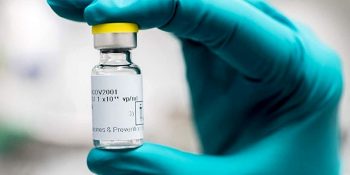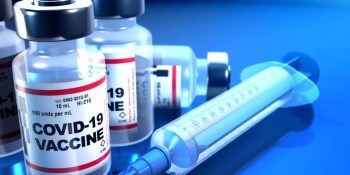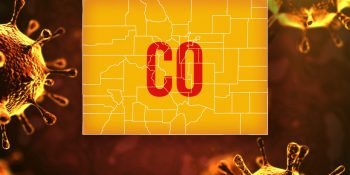
SPREAD THE NEWS
COMMENT, Like, Follow & SHARE @I70Scout
CURRENT EDITION
WEATHER & TRAFFIC PUZZLES RECENT NEWS ADVERTISE WITH US


Colorado expects to receive its first allotment of Janssen’s COVID-19 vaccine this week. The Food and Drug Administration (FDA) granted an Emergency Use Authorization (EUA) for the Janssen vaccine on Feb. 27. The Colorado Department of Public Health and Environment (CDPHE) anticipates receiving an order of 45,500 Janssen vaccines by Friday, March 5. The state treats all orders as estimates until it receives the doses. The Janssen vaccine will be available to eligible Coloradans as soon as Friday at a number of community vaccination sites across the state.
“We are thrilled to be able to distribute a third safe and effective vaccine in the state of Colorado,” said Dr. Eric France, chief medical officer, Colorado Department Public Health Environment. “The authorization of the Janssen vaccine will make it easier for the state to reach its vaccination goals as more people become eligible in the weeks to come. When it’s your turn to get a vaccine — whether it’s Moderna, Pfizer, or Janssen — I hope you choose to get it. With every dose administered, we are all safer and closer to ending this crisis.”
The FDA’s authorization comes after a series of clinical trials showing that the Janssen vaccine is safe and effective. Unlike the Pfizer and Moderna vaccines, which each require two doses, the Janssen vaccine requires only one dose. The Pfizer and Moderna vaccines are both mRNA vaccines, while the Janssen vaccine is a modified adenovirus vaccine, which means it uses a different delivery system to train the immune system to fight COVID-19. Modified adenovirus DNA vaccines, like the Janssen vaccine, use a piece of double-stranded DNA to teach your body how to fight COVID-19. mRNA vaccines, like the Pfizer and Moderna vaccines, use single-stranded mRNA. The goal of every vaccine is the same — they just use a different strategy to achieve that goal.
None of the currently authorized vaccines is currently recommended over any other. All three vaccines are safe and work well to prevent moderate to severe COVID-19 disease.
For more information about COVID-19 vaccines, please visit CDPHE’s vaccine webpage.
Continue to stay up to date by visiting covid19.colorado.gov.

DENVER – Governor Polis released a statement following reports that the FDA has said the Johnson & Johnson vaccine protects against COVID-19.
“I’m thrilled that a third safe and highly effective vaccine will soon arrive in Colorado. Having a vaccine that only requires one dose will help us move more quickly to end the pandemic, and I encourage the federal government to not only approve, but ramp up supply as quickly as possible. We are ready to use many more vaccine doses than we are currently receiving each week.”

Arapahoe County will lead a virtual town hall to discuss the latest COVID vaccination developments as they pertain to the counties overseen by the Tri-County Health Department. Officials from Arapahoe County will be joined by leadership from Adams and Douglas counties, and Tri-County Health officials will be on hand to take questions and provide updates.
At the time of the event, join the conversation at www.arapahoegov.com/Townhall or call in at 855-436-3656.
The Colorado Department of Public Health and Environment launched a new call center for the public to ask questions specifically about the COVID-19 vaccine. Now through the end of January, the vaccine call center is open Monday through Friday, 9 a.m. – 10 p.m., Saturday and Sunday, 9 a.m. – 5 p.m. Beginning Feb. 1, hours will extend to 24 hours a day, seven days a week. The new toll-free number is 1-877-CO VAX CO (1-877-268-2926).
Vaccine call center staff are trained to answer COVID-19 vaccine-related questions, provide information about vaccine providers across the state, and give general information about COVID-19. Fifty operators are available to answer calls and can provide information in multiple languages. Staffing will expand as call volume requires.
The 1-877-CO VAX CO number is the go-to for vaccine-related questions for the general public, but they should continue using the Colorado Health Emergency Line for the Public (COHELP) and 2-1-1 Colorado for general information about COVID-19, such as the number of cases in Colorado, the list of symptoms, or how you can protect yourself.
COHELP can be reached Monday – Friday, 9 a.m. – 10 p.m. and Saturday and Sunday, 9 a.m.- 5 p.m. by dialing 303-389-1687 or 1-877-462-2911.
2-1-1 Colorado Community Resource Navigators are available to help by phone, Monday – Friday from 8 a.m. – 5 p.m. and can be reached by dialing 2-1-1 or toll-free 866-760-6489, or by visiting 211Colorado.org.
Right now, Colorado is in phase 1A and 1B above the dotted line of its vaccine distribution plan, which means frontline health care workers, first responders, and people age 70 and older are eligible to receive the vaccine. Until the vaccine is widely available and used, and community immunity is achieved, it is important to continue taking precautions to slow the spread of the virus, like wearing masks, avoiding large gatherings, and practicing physical distancing. More information about Colorado’s vaccine efforts is available at covid19.colorado.gov/vaccine.
Continue to stay up to date by visiting covid19.colorado.gov.

DENVER – The Colorado Division of Insurance (DOI), part of the Department of Regulatory Agencies (DORA), reminds Coloradans who need individual health insurance (meaning not from an employer) that the deadline to enroll in a health insurance plan for 2021 is Friday, Jan. 15, 2021.
People who enroll by Jan. 15 will have their health insurance start Feb. 1. Missing this deadline means that those who need coverage will have to wait until 2022, unless they experience certain events in their lives like marriage, birth of a child, divorce or loss of other health insurance (these are called “qualifying life events” that allow enrollment outside of open enrollment). Find more information about these events at Connect for Health Colorado’s website “When can I buy insurance?”
“Health insurance is always critical, but it’s especially urgent in 2021, as having health insurance will cover the costs for the COVID-19 vaccine,” said Colorado Insurance Commissioner Michael Conway. “And getting everyone vaccinated will let us beat this pandemic. As always, individual, ACA-compliant plans offer coverage for preventive care, routine care and prescription benefits. They have coverage to protect you and your family if you get sick or injured.”
Colorado individual health insurance consumers can enroll with insurance agents, directly with the insurance companies or through our state’s exchange, Connect for Health Colorado. They can enroll directly on the Connect website connectforhealthco.com, get help by calling 855-752-6749 or find in-person assistance through their statewide network of certified experts at connectforhealthco.com/person-help.
In addition, Connect for Health offers tools such as the Quick Cost & Plan Finder that can help you check if you are eligible for financial assistance and find a plan that fits your needs. About 70% of people applying qualify for financial help. Enrolling through Connect is the only way to receive financial help that can make health insurance more affordable.
According to Connect for Health Colorado, as of Jan. 6, nearly 172,000 had signed up for health insurance during this open enrollment, which surpasses last year’s total for open enrollment.

DENVER – Governor Jared Polis today reiterated Colorado’s commitment to vaccinating 70% of the state’s residents who are 70 and older by February 28th, 2021 along with completing the vaccination of our healthcare workers and first responders.
The state is reviewing the announcement from the Trump administration of their updated guidance as well as actively engaging the incoming Biden administration to understand how they will approach prioritization and supply flow.
Colorado will not be making any changes to our vaccine program until we can get concrete details on supply quantities, timelines for receiving that supply and engaging our partners who are on the ground administering the vaccine. While the state is not making any changes today, the Polis administration is actively planning how we can scale up and expand eligibility in anticipation for receiving more supply of vaccines.
“I am very excited with the announcement that states will be receiving more vaccines in the near term. Here in Colorado, we have a broad current eligible population of over 562,000 people over 70 years of age and based on data-driven goals of saving lives and ending the pandemic, protecting this vulnerable population will have the biggest impact. Our broad focus on vaccinating those over 70 has been one of the reasons that Colorado is one of the top states for the vaccine to be successfully administered,” said Governor Polis.
The Governor agrees that risk-based criteria saves lives. The Polis administration hopes to announce by next week updated plans based on information we do not yet have on new supplies the state of Colorado will receive. Governor Polis remains hopeful that the quantity of vaccines in the state will allow for expansion of the age criteria within a few weeks.

Avoiding surges in infections and hospital demand over the next two months will require a substantial and rapid increase in transmission control
REMOTE, (Nov. 6, 2020): The Colorado Department of Public Health and Environment (CDPHE) and the Colorado School of Public Health released an updated modeling report showing hospitalizations from SARS-CoV-2 are increasing more sharply than last week’s projections. Keeping hospitals at or below demand capacity will require substantial and rapid action to prevent transmission. People should only interact with members of their own household, avoid gatherings, stay home when they are sick, wash their hands, physical distance, and wear a mask.
Colorado has now reached the greatest number of COVID-19 hospitalizations we have had to date, exceeding our peak in April. We reached this even faster than the modeling predicted. If the epidemic curve is not bent, Colorado could surpass intensive care unit (ICU) capacity in late December instead of January as reported in last week’s modeling report. If contacts increase over the holidays (for example, due to gatherings between multiple households), surge capacity could be required in mid-December, unless transmission is reduced.
The latest modeling provides projections based on COVID-19 hospital census data through November 2, 2020. The models are based on Colorado data and assumptions based on the current state of the science.
Key findings from the report:
The Colorado School of Public Health (ColoradoSPH) assembled the expert group that works with the state on modeling projections. The group includes modeling scientists at the ColoradoSPH and the University of Colorado School of Medicine at the CU Anschutz Medical Campus, as well as experts from the University of Colorado Boulder, University of Colorado Denver, and Colorado State University.
All previous modeling reports are available on the Colorado School of Public Health’s COVID-19 website.
The Colorado modeling team began using a new “transmission control” indicator in mid-October to describe the collective impact of all policies and behaviors on the spread of SARS-CoV-2. Transmission control captures ALL behavioral and policy changes in response to the SARS-CoV-2 pandemic including mask wearing, physical distancing, improved ventilation, working from home, contact tracing (including both isolation and quarantine), moving activities outside, and any seasonal impact. This approach has the advantage of requiring fewer assumptions and increasing accuracy for the Colorado model. In technical terms, the transmission control parameter describes the percent decrease in effective contacts between infected and susceptible individuals compared to pre-pandemic behavior.
The state will continue to review data and model findings as the pandemic continues to inform policy decisions.
Continue to stay up to date by visiting covid19.colorado.gov.

November 5, 2020 – The Colorado Department of Revenue (DOR), in conjunction with the Colorado Department of Public Health and Environment (CDPHE), is issuing a health and safety advisory due to the identification of potentially unsafe levels of Total Yeast and Mold contamination on Medical Marijuana flower (bud/shake/trim) produced by Physician Preferred Products LLC (d/b/a Doc’s Apothecary) . The CDPHE and DOR deem it a threat to public health and safety when marijuana is found to have levels of Total Yeast and Mold above the acceptable limits established in MED Rule 4-115.
DOR has identified Harvest Batches of Medical Marijuana produced by Physician Preferred Products LLC that were confirmed to have failed contaminant testing. These contaminated Harvest Batches are listed below. The Harvest Batches were documented as having been produced on May 20, 2020, July 20, 2020 and August 3, 2020. Consumers who have these affected products in their possession should return them to the store from which they were purchased for proper disposal. Consumers who experience adverse health effects from consuming affected products should seek medical attention immediately and report the event to the store from which they purchased the product.
All affected marijuana should have a label affixed to its container that, at a minimum, indicates the license number of the Medical Marijuana Business that cultivated the marijuana as well as the Harvest Batch number assigned to the marijuana. Patients should check the label on their container of Medical Marijuana flower (bud/shake/trim) for the following license number and Harvest Batch numbers.
Medical Marijuana Cultivation Facility License: 403-01905
Total Yeast and Mold Contaminated Harvest Batches: GT05202020F1
BAN07202020F1
TESS07202020F1
GM08032020F2

REMOTE, (November 2, 2020): The Colorado Department of Public Health and Environment (CDPHE) today released a new public health order with streamlined guidance and clarification on the dial framework. The new public health order is similar to past orders, but integrates Protect Our Neighbors, Safer at Home, and Stay at Home orders together, and it makes a series of technical updates requested by stakeholders. It goes into effect at midnight, Nov. 3.
Among the most significant changes, the public health order:
Learn more on this updated capacity chart for all 5 levels.
“We are at a pivotal juncture. We need to change course in November to prevent more Coloradans from getting severely sick. The dial is a critical tool, but regardless of any public health order, we need everyone to step up,” said Jill Hunsaker Ryan, executive director, CDPHE. “We need everyone to fully participate in mitigation tactics—like wearing a mask, distancing a minimum of six feet from others, and not interacting with other households—if we are to suppress the spread of COVID-19 in advance of the holiday season.”